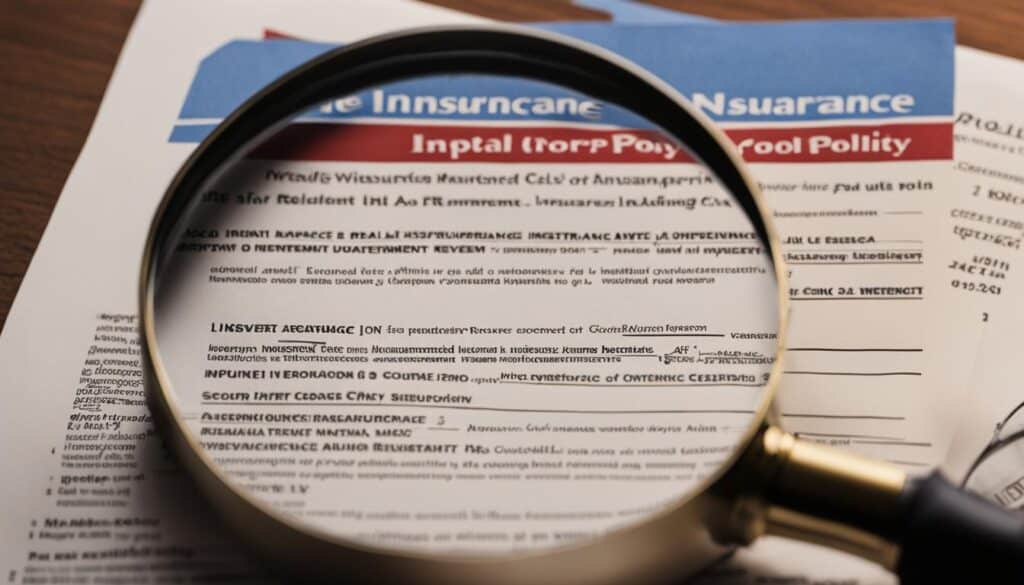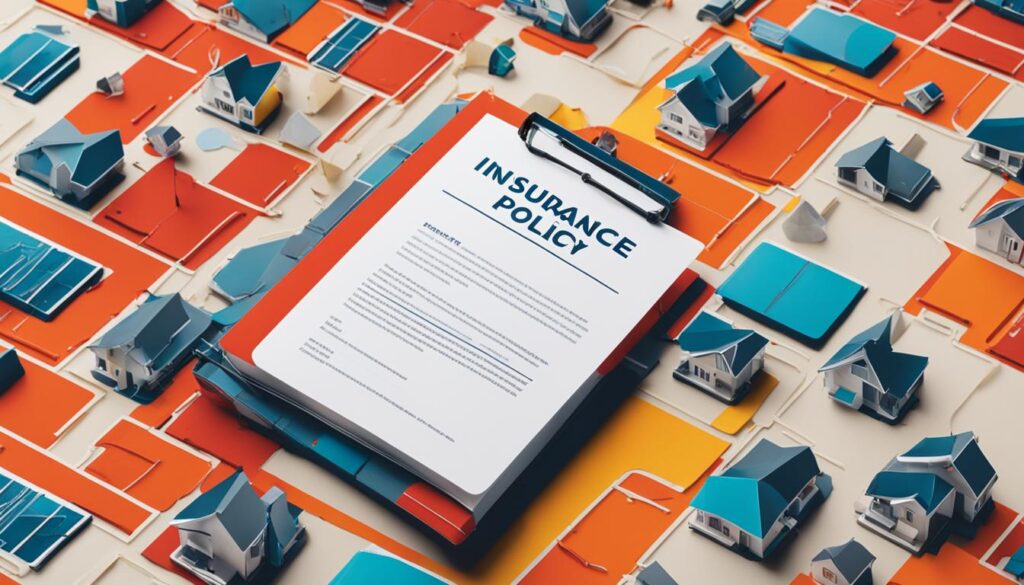As a landlord, it is crucial to have the right insurance coverage to protect your property and income. Property insurance for rental property, also known as landlord insurance or rental property insurance, provides the necessary coverage to safeguard your investment against potential risks and losses.
Unlike homeowner’s insurance, which is designed for owner-occupied properties, landlord insurance is specifically tailored to meet the unique needs of rental properties. It offers comprehensive coverage, including property damage, liability protection, loss of rental income, and additional living expenses, ensuring that you are adequately protected when renting out your property.
To ensure you have the right coverage for your rental property, it is essential to conduct a thorough risk assessment. Evaluate potential hazards, such as the property’s location, environmental risks, and the type of tenants you have. This assessment will help determine the level of coverage needed to protect your investment.
Another crucial step in securing the best insurance coverage is to compare policies from different insurance companies. Request insurance quotes and carefully evaluate the coverage options, rates, and policy costs. By comparing multiple options, you can find the most suitable coverage for your specific needs and budget.
Regularly reviewing and updating your rental property insurance policy is also vital. As your property’s needs change, such as renovations or additions, you may need to modify your coverage. When it comes time to renew your policy, comparing costs from various insurance providers ensures you are getting the best deal.
Remember, rental property insurance is not the same as renter’s insurance. While rental property insurance covers the building and associated property, renter’s insurance is for tenants to protect their personal belongings. It is essential for both landlords and tenants to understand their respective coverage responsibilities.
Investing in rental property insurance is a necessary expense to protect your investment and ensure financial stability. The cost of insurance is generally affordable compared to the potential losses that could occur without adequate coverage. By securing the right insurance policy, you can have peace of mind knowing that your rental property is protected.
Key Takeaways:
- Property insurance for rental property, also known as landlord insurance or rental property insurance, provides coverage to protect your investment and income as a landlord.
- Landlord insurance is specifically designed to meet the unique needs of rental properties, offering comprehensive coverage for property damage, liability protection, loss of rental income, and additional living expenses.
- Conduct a risk assessment to evaluate potential hazards and determine the level of coverage needed for your rental property.
- Compare policies from different insurance companies to ensure you have the best coverage for your specific needs and budget.
- Regularly review and update your rental property insurance policy to ensure it provides adequate protection, especially when property needs change.
The Difference Between Homeowners and Landlord Insurance
When it comes to insuring your rental property, understanding the difference between homeowners insurance and landlord insurance is crucial. While both policies offer coverage for property damage and liability, they are designed to protect different types of properties and assets.
Homeowners insurance is typically intended for properties where the owner resides, such as a primary residence. It provides coverage for the physical structure of the home, personal belongings, and liability for injuries that may occur on the property. However, homeowners insurance may not adequately cover the unique hazards and requirements of rental properties.
“Homeowners insurance may not provide the necessary coverage for rental properties, leaving landlords exposed to potential risks.”
On the other hand, landlord insurance is specifically designed to protect rental properties. It provides comprehensive coverage for property damage, liability, and additional expenses that may arise from renting out your property. Here are some key features of landlord insurance:
- Property Damage Coverage: Landlord insurance covers the physical structure of the rental property, protecting it from damages caused by perils such as fire, storms, vandalism, or theft.
- Liability Coverage: This coverage helps protect landlords from legal liabilities arising from injuries or property damage that occur on the rental property. It can help cover legal fees, medical expenses, and damages awarded in a lawsuit.
- Personal Property Coverage: If you offer furnished rentals or provide appliances or furniture to your tenants, landlord insurance can provide coverage for these items in case of damage or loss.
- Loss of Rental Income: In the event that your rental property becomes uninhabitable due to covered damages, landlord insurance can help compensate you for the loss of rental income during the necessary repairs.
- Additional Living Expenses: If your tenants are temporarily displaced due to covered damages, landlord insurance can help cover their additional living expenses, such as hotel bills or temporary rentals, while their unit is being repaired.
It’s important to note that while landlord insurance provides coverage for your rental property, it does not protect tenants’ personal belongings. To ensure their own belongings are covered, renters should consider obtaining renters insurance.
Having the right insurance coverage is essential for protecting your rental property investment. By choosing landlord insurance, you can gain peace of mind knowing that you have comprehensive coverage that goes beyond what homeowners insurance provides.
Assessing Property Risks
When it comes to renting out a property, conducting a thorough risk assessment is essential in determining the appropriate insurance coverage needed. It involves evaluating potential hazards and risks associated with your rental property to ensure adequate protection. Several factors need to be considered during the risk assessment process, such as the age and condition of the building, the property’s location, and the type of tenants you have.
Environmental Risks:
Assessing environmental risks is particularly important as they can significantly impact the level of coverage required for your rental property. Consider the likelihood of natural disasters such as wildfires, floods, or storms in the area. Understanding these risks will help you determine the appropriate insurance coverage to mitigate potential damages and losses.
Factors to Consider:
- Property Location: Properties in areas prone to natural disasters or high crime rates may require higher coverage limits.
- Property Condition: The age and condition of the building can affect the likelihood of structural issues or maintenance-related incidents.
- Tenant Type: The type of tenants you have can impact the level of risk associated with your rental property. For example, commercial tenants may introduce different risks compared to residential tenants.
By carefully assessing these factors and conducting a thorough risk assessment, you can ensure that your rental property is adequately protected against potential risks and liabilities.
Comparing Policies
When it comes to selecting insurance coverage for your rental property, comparing policies from different insurance companies is crucial. By requesting insurance quotes and evaluating the coverage options, rates, and policy costs, you can find the best fit for your specific needs. It’s essential to consider factors such as the total cost of the policy, including the premium and deductible, to make an informed decision.
By comparing insurance policies, you can ensure that you choose the right coverage that offers adequate protection for your rental property. Here’s a step-by-step guide to help you compare policies effectively:
1. Request Quotes
To compare policies, begin by requesting insurance quotes from multiple insurance companies. Provide them with relevant information about your rental property, such as its location, size, property type, and any additional features or amenities. This will allow insurance companies to provide accurate quotes tailored to your specific property.
2. Evaluate Coverage Options
Once you have obtained quotes, carefully review the coverage options offered by each insurance company. Assess the extent of coverage provided for property damage, liability protection, loss of rental income, and any additional coverage you may require. Look for policies that align with your risk appetite and adequately protect your investment.
3. Compare Rates
Compare the rates offered by different insurance companies, keeping in mind that the lowest premium does not necessarily mean it’s the best policy. Consider the value of the coverage provided in relation to the premium cost. Ensure that you understand the deductible amount and how it may affect your overall expenses in the event of a claim.
4. Review Policy Costs
In addition to the premium and deductible, carefully review the overall costs associated with each policy. Look out for any hidden fees or additional charges that may affect the affordability of the insurance. It’s important to have a clear understanding of the policy’s cost structure before making a decision.
By following these steps and comparing policies, you can make an informed choice that offers the best coverage at a competitive price. Remember, insurance is an essential investment in protecting your rental property and mitigating potential financial risks.

| Insurance Company | Policy Coverage | Rates | Policy Cost (Annual) |
|---|---|---|---|
| ABC Insurance | Property damage, liability, loss of rental income | $150 per month | $1,800 |
| XYZ Insurance | Property damage, liability, loss of rental income, additional coverage options | $120 per month | $1,440 |
| 123 Insurance | Property damage, liability, loss of rental income, higher coverage limits | $160 per month | $1,920 |
Considering Premiums and Deductibles
When it comes to insurance for your rental property, it’s important to understand the factors that contribute to insurance premiums and deductibles. These two aspects play a significant role in determining the cost of your insurance policy and the financial impact it may have on your investment.
Insurance Premiums:
Your insurance premiums are the monthly payments you make to maintain your coverage. Several factors can influence the amount you pay:
- The type of coverage you select
- The value of your rental property
- The location of your property
Insurance companies take these factors into account when determining the risk associated with insuring your rental property. Generally, the higher the risk, the higher your insurance premiums will be.
Insurance Deductibles:
Insurance deductibles are the amount of money you must pay out of pocket before your insurance coverage kicks in. Deductibles serve two main purposes:
- To discourage policyholders from making frequent small claims
- To reduce the overall cost of insurance for both policyholders and insurance companies
The higher your deductible, the lower your insurance premiums are likely to be. However, it’s essential to evaluate your financial situation and determine what deductible amount you can comfortably afford in the event of a claim.
Keep in mind that insurance premiums and deductibles are often interconnected. In some cases, choosing a higher deductible can lead to lower insurance premiums, while a lower deductible may result in higher premiums.
Understanding the relationship between insurance premiums and deductibles will help you make an informed decision about the cost of your insurance policy. Consider your budget, property value, and level of risk to strike a balance between affordable premiums and a deductible that aligns with your financial capabilities.
Now, let’s take a closer look at how insurance premiums and deductibles can vary based on different factors:
| Premium Factors | Description |
|---|---|
| Type of coverage | The specific type of policy and coverage options selected can impact your insurance premiums. |
| Property value | The value of your rental property can influence the cost of your insurance premiums. Higher valued properties may require higher coverage limits, resulting in higher premiums. |
| Property location | The location of your rental property plays a role in determining the risk associated with insuring it. Properties in high-risk areas may face higher premiums. |
| Deductible Factors | Description |
|---|---|
| Financial capability | Your ability to cover the out-of-pocket expenses associated with a deductible should be considered when selecting a deductible amount. |
| Risk tolerance | Your willingness to accept a higher out-of-pocket expense in the event of a claim should be taken into account when choosing a deductible. |

Updating Your Rental Property Insurance Policy
Regularly reviewing and updating your rental property insurance policy is crucial to ensure that you have adequate protection in place. As your needs and circumstances change over time, it’s important to evaluate your coverage options and make any necessary modifications.
Evaluating Coverage Needs
When reviewing your insurance policy, consider any changes in your rental property that may affect your coverage requirements. Have you made renovations or additions to the property that could increase its value? Does the current policy provide sufficient coverage for these modifications?
Assessing your coverage needs involves evaluating various factors, such as the replacement cost of your property, the potential liability risks associated with your tenants, and any additional structures on the property that may require coverage. It’s essential to ensure that your policy reflects the changing needs of your rental property.
Increasing Coverage
If you determine that your current coverage is inadequate, it’s important to consider increasing your insurance policy’s limits. This can help protect you from potential financial losses in the event of unforeseen circumstances, such as significant property damage or liability claims.
Increasing your coverage may involve adjusting the limits for property damage, liability coverage, or loss of rental income. By doing so, you can mitigate the risk of being underinsured and facing substantial costs in the event of a covered incident.
Comparing Insurance Providers
When it comes time to renew your rental property insurance policy, don’t settle for the status quo. Take the opportunity to compare insurance costs from multiple providers to ensure you’re getting the best deal. Insurance costs can vary significantly between companies, so it’s important to shop around.
A comprehensive review of your policy and a comparison of insurance costs can help ensure you have the right coverage at the best price.
Consider requesting quotes from different insurance companies and evaluating the coverage options and rates they offer. Don’t just focus on the premium cost alone; also consider aspects such as deductibles, coverage limitations, and additional benefits provided by each policy. Taking the time to do this research can result in significant savings without compromising the quality of your coverage.
Comparison of Insurance Provider Quotes
Below is a comparison table of insurance quotes from different providers, showcasing the premium costs, coverage limits, and deductibles for a rental property insurance policy:
| Insurance Provider | Premium Cost (Annual) | Property Damage Coverage Limit | Liability Coverage Limit | Deductible |
|---|---|---|---|---|
| Company A | $800 | $250,000 | $1 million | $1,000 |
| Company B | $900 | $300,000 | $2 million | $1,500 |
| Company C | $750 | $200,000 | $1.5 million | $1,200 |
The table above provides a clear comparison of insurance quotes, allowing you to make an informed decision based on cost and coverage.

Updating your rental property insurance policy is essential for keeping up with changing needs and ensuring you have adequate coverage. By evaluating your coverage, increasing it if necessary, and comparing insurance costs from multiple providers, you can secure the best insurance policy for your rental property while minimizing costs.
Rental Property Insurance vs Renter’s Insurance
When it comes to insurance for rental properties, it’s important to understand the difference between rental property insurance and renter’s insurance. Rental property insurance, also known as landlord insurance, focuses on protecting the actual rental building and associated property. On the other hand, renter’s insurance is designed to cover the personal belongings of tenants.
Landlords have a responsibility to purchase rental property insurance to safeguard their property, while tenants are encouraged to obtain renter’s insurance to protect their own belongings. Let’s take a closer look at the distinctions between these two types of insurance and the coverage they provide.
Rental Property Insurance:
Rental property insurance offers property coverage and liability coverage for landlords. It protects against various risks such as fire, vandalism, theft, and natural disasters. This insurance typically covers the dwelling, other structures on the property (like garages or sheds), and sometimes even loss of rental income. Liability coverage is vital in case someone gets injured on the rental property and files a lawsuit against the landlord. Rental property insurance is a crucial aspect of a landlord’s responsibilities and helps ensure financial protection for their investment.
Renter’s Insurance:
Renter’s insurance, on the other hand, focuses on protecting tenants’ personal belongings. This insurance provides coverage for the loss or damage of items such as furniture, electronics, and clothing due to events like theft, fire, or vandalism. Renter’s insurance also includes liability coverage, protecting tenants if someone is injured while visiting their rented property.

It’s important for tenants to understand that their personal belongings are not covered under the landlord’s rental property insurance. Landlords are not responsible for replacing or repairing tenants’ belongings in the event of damage or loss. Therefore, it is advisable for tenants to secure their own renter’s insurance policy to protect their personal property.
It’s important for tenants to understand that their personal belongings are not covered under the landlord’s rental property insurance.
In summary, rental property insurance and renter’s insurance serve different purposes and cover distinct aspects of a rental arrangement. While rental property insurance protects the physical property and provides liability coverage for landlords, renter’s insurance safeguards tenants’ personal belongings and offers liability coverage for tenants. Both types of insurance play a crucial role in ensuring comprehensive coverage and protecting the interests of both landlords and tenants.
Rental Insurance Covers Legal Fees
When it comes to being a landlord, it’s crucial to have the right insurance coverage to protect yourself from potentially costly legal expenses. Landlord insurance provides liability coverage that safeguards you against claims and legal costs that may arise in the event of accidents or injuries on your rental property. This coverage not only helps cover medical expenses for injured parties but also provides legal protection in the event of a lawsuit.
Liability claims can arise from various situations, such as slip and fall accidents, property damage caused by negligence, or injuries suffered by tenants or their guests. Without proper insurance coverage, you could be held financially responsible for these expenses. However, with adequate landlord liability coverage, you can have peace of mind knowing that your insurance policy will help cover legal expenses.
The Importance of Liability Coverage
Legal expenses can quickly escalate, especially in the event of a lawsuit. Not only can you be faced with medical bills, but you may also need to hire legal representation to defend your case. These expenses can add up, potentially putting your financial stability at risk.
Having liability coverage as part of your rental insurance policy ensures that you have the necessary protection to handle legal matters that may arise. Key benefits of landlord liability coverage include:
- Medical coverage: In the event of an accident or injury on your rental property, liability coverage can help cover the medical costs for injured parties.
- Legal representation: If a lawsuit is filed against you, liability coverage can help cover the costs of hiring an attorney to defend your case.
- Settlements or judgments: Should you be found legally responsible for damages or injuries, liability coverage can help cover the costs of settlements or court-ordered judgments.
By having the right insurance coverage in place, you can protect yourself from the potentially significant financial burden that legal expenses can bring.
“Landlord insurance provides liability coverage that safeguards you against claims and legal costs.”
Remember, accidents can happen unexpectedly, and even the most responsible landlords can find themselves facing legal action. Whether it’s a slip and fall accident, property damage, or any other liability claim, being prepared with insurance coverage can make all the difference.
Ensure that your rental insurance policy includes liability coverage to protect yourself from the uncertainties of legal expenses. Make sure to review your policy regularly and consult with your insurance provider to understand the specific coverage, limits, and requirements.

| Benefits of Landlord Liability Coverage | Details |
|---|---|
| Protection against legal expenses | Landlord insurance provides coverage for legal fees and associated expenses in the event of a liability claim or lawsuit. |
| Medical coverage | Liability coverage helps cover medical expenses for injured parties, reducing your out-of-pocket costs. |
| Legal representation | If you face a lawsuit, liability coverage can help cover the costs of hiring an attorney to represent you. |
| Settlements and judgments | Should you be found responsible for damages or injuries, liability coverage can help cover the costs of settlements or court-ordered judgments. |
Vacant Homes Still Need Insurance
Even if your rental property is currently vacant, it is important to have insurance coverage to protect the property and any additional structures, such as sheds or garages. Liability coverage is also crucial in case of accidents or injuries on the property, even if it is unoccupied.
Property protection is essential to safeguard against potential damages or losses that can occur while the property is vacant. Insurance for vacant homes provides financial coverage for various risks, including vandalism, theft, or damage caused by natural disasters.
Additionally, liability coverage is an important aspect to consider. Accidents can occur on the property, such as someone tripping and falling, even when it is unoccupied. Liability coverage helps cover legal expenses and potential damages if someone sues you for injuries sustained on the vacant property.
Also Read:- Guarding Your Assets: Navigating The Landscape Of Business Property Insurance
Furthermore, if there are any additional structures on the property, such as sheds or garages, you’ll want to ensure that they are also covered by insurance. Additional structures coverage can protect these structures from damage or destruction.
One way to enhance your liability coverage is by considering an umbrella policy. An umbrella policy provides additional liability protection that goes beyond the limits of your standard insurance policy. It offers an extra layer of coverage for any unexpected get a quote liability claims that may arise.
Ensuring that your vacant home has insurance coverage not only provides protection for your property and structures, but it also gives you peace of mind during the periods of vacancy. Despite the property being unoccupied, having insurance in place safeguards your investment and mitigates potential financial risks.
You Need Property Insurance to Protect Yourself from Storm Damages
When it comes to protecting your rental property from storm damages and natural disasters, having the right insurance coverage is crucial. Landlord insurance provides the necessary protection to cover the cost of repairs or replacement in the event of severe weather damage. With the unpredictability of storms and the potential for significant property damage, it is essential to have adequate coverage in place to protect yourself from potential losses.
Storm damage coverage is a key component of landlord insurance, ensuring that you are financially safeguarded when natural disasters strike. Whether it’s wind, hail, or flooding, storms can cause extensive damage to your property, leaving you with costly repairs and replacement costs. Having the right insurance coverage provides you with peace of mind, knowing that your property is protected and that you won’t be burdened with significant financial expenses.
In the unfortunate event of storm damage, an insurance claim can help you recover and restore your property to its pre-storm condition. By home insurance policy filing an insurance claim, you can receive the necessary funds to cover the replacement costs of damaged items, repairs to the property structure, and even additional living expenses if the property becomes uninhabitable. This financial support enables you to quickly recover from the storm and restore your rental property without facing significant financial strain.
Insurance claims provide the necessary financial support to repair or replace storm-damaged property, ensuring that your investment remains protected and your rental business can continue without interruption.
It is important to note that the cost of storm damage can extend beyond the immediate repairs. In some cases, the cost of replacing damaged property may exceed the actual cash value (ACV). ACV takes into account the property’s depreciation, which means that you may receive a lower payout based on the item’s age and condition at the time of the storm. To ensure full replacement coverage, consider opting for replacement cost coverage, which like homeowners insurance provides funds to replace damaged items with new ones of similar kind and quality.
To give you a better understanding of the importance of storm damage coverage, here is a table illustrating the potential costs associated with various types of storm damage:
| Types of Storm Damage | Estimated Repair/Replacement Costs |
|---|---|
| Roof Damage from Strong Winds | $5,000 – $10,000 |
| Flooding and Water Damage | $10,000 – $20,000 |
| Tree or Debris Damage | $2,000 – $8,000 |
H3: Understanding Replacement Costs
As mentioned earlier, replacement cost coverage is an essential aspect of storm damage insurance. While actual cash value (ACV) takes into account depreciation and pays out based on the item’s current market value, replacement cost coverage allows you to receive funds to replace damaged items with new ones of similar quality. This ensures dwelling coverage that you can fully restore your property without facing significant out-of-pocket expenses.
In addition to the coverage provided by landlord insurance, it is also recommended to take proactive measures to protect your rental property from storm damages. Regular maintenance, such as trimming trees, securing loose items, and reinforcing windows, can help minimize the risk of damage during storms. By combining preventive measures with adequate insurance coverage, you can effectively protect yourself and your investment from the potential financial impact of severe weather events.
It’s a Necessary Expense
Rental property insurance is an essential expense for landlords looking to protect their investment and ensure financial stability. While the cost of insurance can vary depending on factors such as the location and value of the property, it is generally an renters insurance policy affordable expense compared to the potential losses that could occur without adequate coverage.
Investing in rental property insurance provides peace of mind by safeguarding your property from various risks and hazards. Whether it’s protecting your building from property damage, liability claims, or covering the loss of rental income, insurance offers comprehensive property protection.
By having insurance for your rental property, you can mitigate the financial risks associated with unexpected events such as fires, storms, or accidents. Instead of bearing the full burden of the repair costs or legal fees, insurance coverage provides the necessary financial support, maintaining your financial stability and protecting your investment.
While insurance affordability is a significant consideration, it’s important to strike a balance between the cost and the level of coverage provided. Carefully assess the coverage options and rates offered by different insurance companies to vacation rental find the best fit for your specific needs and budget.
To further exemplify the importance of rental property insurance, here’s a table showcasing the potential financial implications of not having adequate coverage:
| Scenario | Loss Incurred |
|---|---|
| Fire damage to the property | $50,000 in repairs |
| Liability claim from a tenant’s injury | $25,000 in legal fees |
| Theft of valuable items from the property | $10,000 in losses |
| Total loss of rental income due to property damage | $15,000 |
As the table shows, not having rental property insurance could result in significant financial losses that could jeopardize your investment and overall financial stability. The cost of insurance pales in comparison to the potential expenses you could face without it.
Therefore, prioritize property protection by investing in rental property insurance to secure your investment, ensure financial stability, and have peace of mind knowing that your property is adequately covered.
Conclusion
Property insurance plays a vital role in protecting your investment and ensuring the financial stability of your rental property. By understanding the unique hazards and risks associated with your property, you can select the right insurance coverage to flood insurance safeguard your investment.
Comparing insurance policies from different providers allows you to find the best coverage for your specific needs and budget. Regularly reviewing and updating your insurance coverage ensures that you have the appropriate level of protection as your property and circumstances change over time.
Investing in property insurance not only provides peace of mind but also shields you from potential risks and losses. With an insurance policy in place, you rent your property can have confidence that your rental property is protected, allowing you to focus on maximizing your home insurance investment without worrying about unforeseen events.
FAQs
Q: What is the difference between homeowner’s insurance and landlord insurance?
A: Homeowner’s insurance is designed for properties where the owner resides, while landlord insurance is specifically designed to protect rental properties.
Q: What does landlord insurance cover?
A: Landlord insurance typically covers property damage, liability, personal property (if provided to tenants), loss of rental income, and additional living expenses.
Q: Do tenants need their own insurance?
A: Yes, tenants should have their own renter’s insurance to protect their personal belongings, as landlord insurance does not cover tenant possessions.
Q: How can I assess the risks to my rental property?
A: You can assess risks by considering factors such as the age and condition of the building, the location of the property, and the type of tenants you have.
Q: How can I compare insurance policies for my rental property?
A: You can request insurance quotes and evaluate coverage options, rates, and policy costs from different insurance companies.
Q: What factors affect the cost of insurance for my rental property?
A: The cost of insurance depends on factors such as the type of coverage selected, the value of the property, and the property’s location.
Q: How often should I review my rental property insurance policy?
A: It is important to regularly review your policy to ensure it provides adequate protection, especially when there are changes to the property or your needs.
Q: What is the difference between rental property insurance and renter’s insurance?
A: Rental property insurance protects the property itself, while renter’s insurance covers tenants’ personal belongings.
Q: Does landlord insurance cover legal expenses?
A: Yes, landlord insurance often includes liability coverage that protects against legal expenses in case of accidents or injuries on the rental property.
Q: Do vacant rental properties still need insurance?
A: Yes, it is important to have insurance coverage even for vacant rental properties to protect against property damage and liability claims.
Q: Does rental property insurance cover storm damages?
A: Yes, rental property insurance typically provides coverage for property damage caused by storms and natural disasters.
Q: Is rental property insurance worth the cost?
A: Yes, rental property insurance is a necessary expense to protect your investment and ensure financial stability.
Q: What is property insurance for rental property?
A: Property insurance for rental property is a type of insurance that provides coverage for a property owner’s rental units. It helps protect the investment property from damages and potential liability issues.
Q: Why do I need property insurance for rental property?
A: Property insurance for rental property is essential to protect your investment from potential damages, natural disasters, and liability claims. It helps ensure that your rental property is financially secure.
Q: How is property insurance for rental property different from homeowners insurance?
A: While homeowners insurance is designed to cover a property that is occupied by the owner, property insurance for rental property focuses on providing coverage for properties that are rented out to tenants.
Q: What does property insurance for rental property typically cover?
A: Property insurance for rental property typically covers the physical structure of the building, liability protection, loss of rental income, and potentially additional options for specific risks like flood or earthquake damage.
Q: How can I find the right insurance company for property insurance for rental property?
A: To find the right insurance company for property insurance for rental property, it’s important to research and compare different insurance companies. Look for companies that specialize in landlord coverage and have a good reputation for customer service.
Q: What factors should I consider when purchasing property insurance for rental property?
A: When purchasing property insurance for rental property, consider factors such as the level of coverage needed, the cost of the insurance, the reputation of the insurance carrier, and specific additional coverage options based on the property’s location and potential risks.
Q: Can property insurance for rental property help protect against lost rental income?
A: Yes, property insurance for rental property can include coverage for lost rental income due to covered damages to the property, such as fire or weather-related incidents that render the property uninhabitable for a period of time.
Q: Is property insurance for rental property essential for landlords?
A: Yes, property insurance for rental property is essential for landlords as it helps protect their investment in rental properties and provides financial security in the event of unforeseen damages or liability claims.
Q: Can property insurance for rental property be purchased separately from homeowners insurance?
A: Yes, property insurance for rental property is typically a separate policy from homeowners insurance, as it is specifically designed to address the unique risks and coverage needs of rental properties.
Q: How can property insurance for rental property help protect against liability issues?
A: Property insurance for rental property can include liability protection, which helps safeguard landlords in the event that a tenant or visitor is injured on the rented property, potentially covering legal fees and settlement costs related to such incidents.



